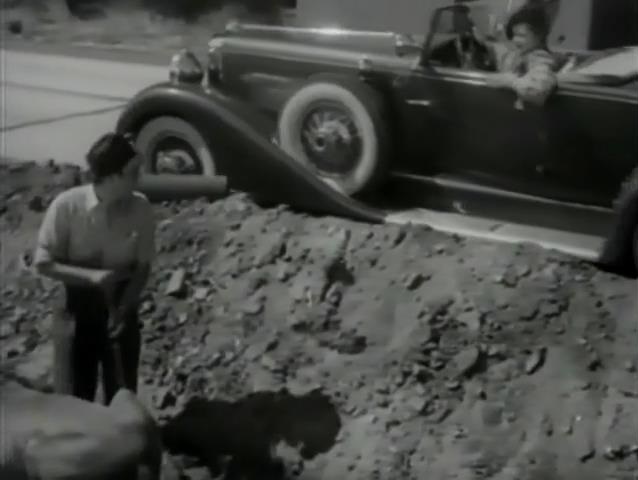Next Time I Marry

The heiress and
the hobo, or W.P.A. meets the foreign debt, or Caroline and the “patent-leather Count”, in successive
analyses by Minnelli (The Long, Long Trailer) and Kubrick (Lolita) and Lumet (The Last of the Mobile Hotshots).
In itself, a
mammoth undertaking to seize (saisir, Ezra Pound’s French) Capra’s It Happened One Night for broad
inspection on a whirlwind basis, from a script not by Kanin yet demonstrating
his powers of analysis behind the camera, as when a slow burn on the face of
Uncle Crock (or Crook) sustains the Wildean
dimensions of his absence from the plot, for example.
Metty cinematography,
Polglase sets, Webb score.
Mantan
Moreland, father of Norman Fell and Burt Young.
Leonard
Maltin, “silly, likable nonsense... unjustly
maligned”. TV Guide, “implausible yarn... suffers
from too much action that goes unexplained.” Halliwell’s Film Guide, “tedious”, citing Variety, “very poor”.
The Great Man Votes
How “an
American city, 1923” acquired the services of a learned man as
Commissioner of Education, despite the party machine and the mayor’s
brother-in-law.
The two lines of
construction tend from Chaplin’s The Kid toward Coe’s A Thousand
Clowns importantly, and much more mysteriously at once through Preston
Sturges’ The Great McGinty to Whorf’s Champagne for
Caesar and Tashlin’s Will Success Spoil Rock Hunter? (Welles
seems to have taken Rosebud from the opening scene).
“The human
individuality, if strong enough, will be discovered in the swamps of
obscurity,” so says “the scrubbiest Roman of them all,” late
of Harvard, a widower on the outs with her very rich family.
John Greenleaf
Whittier has a word to say about “The Poor Voter on Election Day”.
Kanin’s view of the place is essentially akin to
Sternberg’s in The Town.
A
real intellectual film with an understanding of children, as witness this
dialogue between the scholar’s young son and daughter.
“It seems
to me, people are just as mean in the country as they are in the city.”
“People are
mean all over. The nice thing about the country is,
there aren’t so many people.”
Variety interpreted this to mean “it will be hailed
by class audiences as a fine example of the film art, yet carrying sock appeal
for mass patronage” (cited in Halliwell’s Film Guide, where
“funny political comedy” is the ticket).
“His work
is not without charm and talent,” says Andrew Sarris in The American
Cinema, preferring Kanin’s screenplays.
“The wide
world has not wealth to buy the power in my right hand,” says “a
voter by the name of Mr. Whittier.”
My Favorite Wife
One
of the greatest comedies, an absolute masterpiece for the discovery of its
structure and the supreme skill of its resolution, a comedy like no other.
She is declared dead and supplanted of a morning, returns to
disrupt the honeymoon naturally enough that evening, but where has she been,
and with whom, and what is one to do about that?
It had the inestimable virtue of tickling Bosley Crowther (New York
Times), “frankly fanciful farce, a rondo of refined ribaldries and an
altogether delightful picture”.
Variety was slightly
less bemused but couldn’t completely grasp it either, finding the plot
“pretty thin in spots”.
For Time Out Film Guide,
“relatively formulaic”, for Dave Kehr (Chicago Reader), “late, trivial
screwball comedy”, which is how these things work out.
Halliwell dimly perceived the theme and its “brightest
treatment”, he also gives Otis Ferguson’s
“glow on it.”
Among the cast and crew, some Kanin
regulars in new guises.
Tom Dick and Harry
The car salesman
married to his job, the millionaire, and the car mechanic disillusioned by his
boss’s suicide, respectively.
Dick’s a
dream (“Adolf Hitler Assassinated”, says
the newspaper), and English to boot. Tom grumbles at Hitler in the newsreel,
“rallying his people”.
With Harry you hear bells.
The Taming of
the Shrew
is on with Lunt and Fontanne
for the Theatre Guild, Inc., “only Chicago appearance”, Dick flies
Janie there.
“Well, what do you think of it?”
“Oh, it’s wonderful,” is her intermission
reply, “it’s really wonderful, it’s like
a—a moving picture!”
Bosley Crowther of the New York Times wrote “there is no
story, really,” and spoke of “some slightly strained
moments,” concluding with “the fantasy is once or twice too
coy.”
Variety saw “a
modern Cinderella with punchy script and dialog.”
Otis Ferguson was still more attentive, “foot by foot the
best made picture of this year,” cited in Halliwell’s Film Guide, which describes a “minor classic”
that “seems to have faded”.
Jonathan Rosenbaum (Chicago
Reader) has the screenwriter down as a “communist”, the Burton
Motors pitch is indeed a very funny sendup and
famously accurate.
Ring of Steel
A dithyramb to
the fighting man from the Office of Emergency Management Film Unit,
“dedicated to the American soldier”.
Text by Wallace
Russell, spoken by Spencer Tracy, score by Morton Gould.
Apposite images
tell the story from the earliest times, “and now, today, here I come
again.”